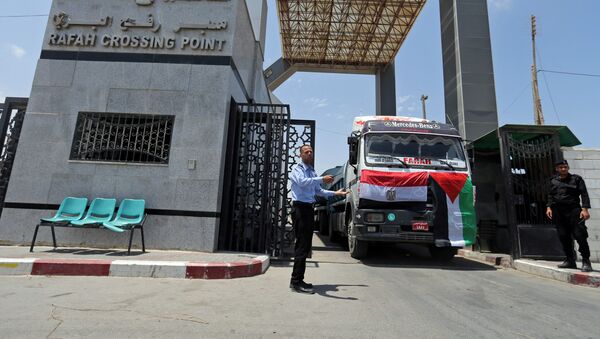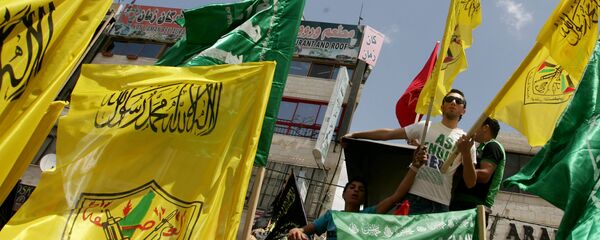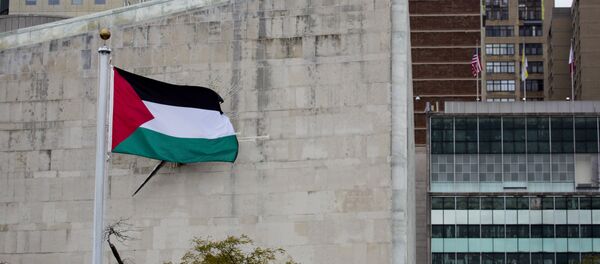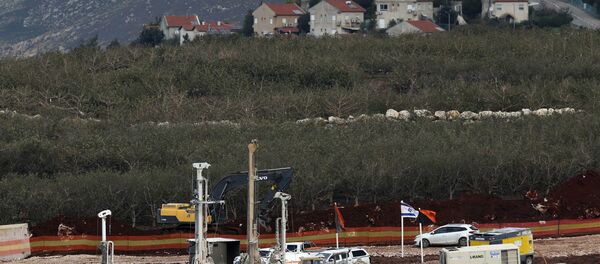The government's resignation will deepen the division between the West Bank and the Gaza Strip, says Professor Mazin Qumsiyeh, director of the Museum of Natural History at Bethlehem University and a Palestinian activist, commenting on the decision by Palestinian Prime Minister Rami Al-Hamdallah to step down.
On 29 January, the Palestinian prime minister and the national unity government, which was formed in 2014 to reconcile the rival governments in the West Bank and Gaza, resigned.
"The president will begin consultation to form a political government made up by factions of the Palestine Liberation Organisation (PLO) that will prepare for the holding of [a] new parliamentary election", Abbas stated.
Speaking to Radio Sputnik, Qumsiyeh opined that there would be little if any changes in the government's political course with regard to the Fatah-Hamas reconciliation process. According to the academic, the previous unity government "was not allowed to really operate in the sense of having reconciliation, because the reconciliation agreement was not implemented by either Fatah or Hamas".
"At this point, basically, the Palestinian Authority (PA) is run out of Ramallah by Fatah, which is one of Palestinian factions and the Palestinian Authority in Gaza is run by Hamas, another Palestinian faction, and many other Palestinian factions are outside of this arrangement. And I am not happy about this arrangement. There is not a unified government", the professor emphasised.
Prospects of Fatah-Hamas Reconciliation Fading Day by Day
According to him, the prospects of reconciliation "are becoming smaller by the day", since there is a "very high level of distrust" between Fatah and Hamas.
"There's a lot of bitterness among Fatah against Hamas", Litvak told Radio Sputnik. "Recently Fatah wanted to celebrate its anniversary in Gaza and Hamas didn't allow them to carry out the ceremony and even dispersed them by force".
According to the Israeli expert, Hamas feels pressure inside Gaza because of the bad economic situation in the region and "they are not willing to make any concessions to Fatah by giving up some of the absolute political control over Gaza".
What Will the Next PA Government be Up to?
It appears that Hamas is not happy with the Hamdallah cabinet's resignation: the organization has condemned the move as an attempt to marginalise the movement and exclude it from Palestinian politics. The Hamas leadership even went so far as to claim that the resignation would lead to the creation of a new "separatist government".
"I think it will deepen the division. We already have, as I mentioned, a separatist government and it will deepen the division", the Palestinian activist reiterated, commenting on the Fatah-Hamas row.
According to Litvak, what the new government is likely to seek is "to reassert their position and hope to increase their legitimacy in the Palestinian population".
"What they are trying to do now is to bring more Fatah activists to the government", the Israeli scholar presumed.
Still, he specified that it is not the Palestinian Authority government that makes policies: "The person that makes policies is Abbas", Litvak opined.
"So, whether or not some ministers in the Palestinian government change, that doesn't bring about any change in the political situation or in the relations between the Palestinians and the Israelis", he underscored.
The Fatah-Hamas spat culminated in the 2007 Battle of Gaza, when the militants managed to take control of the Gaza Strip. As a result, the Palestinian territories were de facto divided between the two entities, although Fatah and Hamas signed the Mecca Agreement in February 2007 and agreed to form a national unity government.
The views and opinions expressed by the speakers do not necessarily reflect those of Sputnik.







